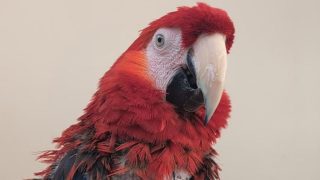
Animals Begin New Lives at Sanctuaries After Rescue from Pennsylvania Roadside Zoo
The settlement agreement involves relocating 45 captive animals from a bleak roadside zoo to peaceful sanctuary homes over a five-year period
Contact: media@aldf.org
SAN FRANCISCO — Today, the Animal Legal Defense Fund (ALDF) announced that a process is underway to relocate animals from a rural Pennsylvania roadside zoo to animal sanctuaries following a settlement agreement requiring 45 animals to be transferred to new homes over a five-year period. The rescue began in November 2024 with a scarlet macaw named Scarlet going to Best Friends Animal Sanctuary in Kanab, Utah; a ring-tailed lemur to Endangered Primate Foundation’s Prosimian Sanctuary in Jacksonville, Florida; and two gray wolves to a sanctuary in Pennsylvania.
In January 2019, ALDF filed a lawsuit against the roadside zoo, for maintaining animals in conditions in violation of the Endangered Species Act (ESA) and state wildlife laws. The ring-tailed lemur, named Mrs. Lemur, was kept alone in a tiny enclosure that was inadequate for her species’ needs. Lemurs are highly social animals who live in large troops and travel long distances in the wild.
During litigation, Scarlet was added to the ESA claim after the rural Pennsylvania zoo acquired the bird. It was the first known ESA claim brought on behalf of a captive bird protected by the statute. Scarlet was living alone in a cage without enrichment or the opportunity to fly or socialize with other parrots. Markedly underweight, Scarlet had plucked almost every feather from her body.
The two wolves, Ridge and Arrow, lived in a small, fenced area, inadequate to meet their physical and psychological needs. Overall, the animals at the zoo were not receiving adequate veterinary care — a fact that became apparent after Ridge fractured his leg at the facility.
“When roadside zoos are not held accountable for failing to operate within the requirements of critical animal protection laws, the animals are forced to suffer in silence,” said ALDF Senior Staff Attorney Caitlin Foley. “We are thrilled to have played a part in securing the relocation of captive animals from a rural Pennsylvania roadside zoo who deserve a better life — one they can live on their own terms and not for the entertainment of others.”
“We are happy to partner with ALDF in pursuit of qualified, professional care for lemurs and other exotic animals,” said Endangered Primate Foundation’s Prosimian Sanctuary’s Tracy Fenn. “Most importantly, we are pleased to be able to provide Ms. Lemur socialization with conspecifics, which is critical to lemur well-being.”
Roadside zoos dot the American landscape. They’re generally small menageries where wild animals such as lions, tigers, monkeys, wolves, and others are kept in captivity, and often suffer greatly. The animals frequently live in small, dirty cages. They are fed inadequate food and are denied medical care. They have little in the way of mental stimulation — often, not even the company of other animals, since many roadside zoos keep animals confined alone in individual cages. Sometimes roadside zoos also encourage dangerous interactions between animals and visitors, such as bottle-feeding bear cubs.
The Pennsylvania Game Commission is in charge of regulating the welfare of animals exhibited at roadside zoos, or “menageries.” Under existing Pennsylvania law, the Commission is responsible for ensuring the animals are exhibited in safe and humane conditions, in a manner that does not result in mistreatment or neglect, and that ensures adequate veterinary care is provided. Despite this mandate, the Commission employs inspectors with little expertise in evaluating the condition of the animals exhibited at the zoos.
The Animal Welfare Act is the chief federal law that governs roadside zoos. The law itself, as well as its enforcement by the U.S. Department of Agriculture, are frequently criticized for allowing roadside zoo operators’ inhumane practices to go unchecked. State laws vary considerably, with some having such lax oversight that the states become known as havens for cruel roadside zoos. ALDF advocates for stronger state and federal laws, and protections under existing laws.
Photos and video of the macaw and lemur who were relocated are available upon request.
For more information, visit aldf.org/roadside.
Sign Up!
Join the Animal Legal Defense Fund's email list to stay up to date on lawsuits, legislation, and regulations affecting animals.
Related
-
Resolution Opposing Elective Cat Declaw Surgeries Introduced in the U.S. House of Representatives
Declawing is a cruel surgical procedure to remove the last bone in a cat's toesDecember 16, 2025 Press Release -
California Governor Signs Animal Protection Bills into Law
The Animal Legal Defense Fund sponsored two bills protecting cats and wild animalsOctober 21, 2025 News -
ALDF Urges Justice for Cat Victims in Elkhart County
The county’s prosecutor dismissed criminal charges against the manufacturing plant employees who killed two feral cats in a trash compactorAugust 11, 2025 News




